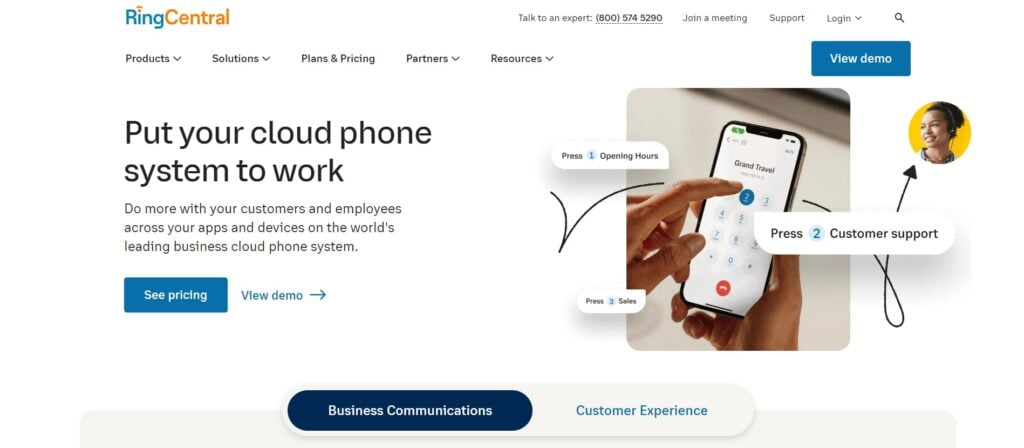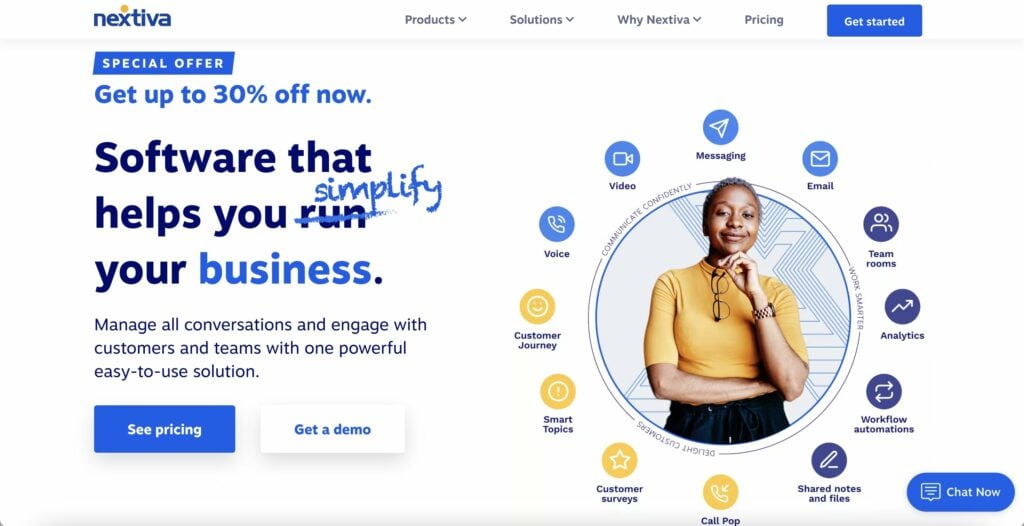One of the most common decisions businesses make is using a traditional PBX phone system or VoIP phone system.
A few key differences between these two options should be considered before deciding.
This article will compare PBX vs. VoIP and discuss the most important differences between the two phone systems and how each can help your business run more efficiently.
We’ll also break down the pros and cons of each system below to help you decide which option is best for your business.
What Is PBX?
PBX phone systems, otherwise known as Private Branch Exchange, is a business phone system that links office desk phones within the same network.
Using PBX, employees of a company can make calls to one another and freely transfer calls. This system relies on Public Switched Telephone Network and on-premise hardware to facilitate calls.
This implies that the PBX (private branch exchange) systems are fixed to a single location and are only accessible on connected devices.
How Does PBX Work?
As earlier stated, PBX (private branch exchange) phone systems use PSTN or Public Switched Telephone Networks to facilitate voice calls. It relies on circuit switching and copper wiring to make and receive calls.
The hosted PBX phone systems link to standard phone lines from a local phone service provider. This connection usually consists of wires that are cross-connected in the office.
What Is VoIP?
VoIP, which stands for Voice Over Internet Protocol in full is a phone system that uses an internet connection to transmit voice data. Rather than depending on the physical wiring of the PSTN to make and receive calls,
VoIP PBX systems rely on an active data network. This means that VoIP PBX doesn’t need an in-house physical network to operate and is thus accessible on any device, including a desktop computer, laptop, or cell phone, from anywhere.
How Does VoIP Work?
When an end-user initiates phone calls, a VoIP phone system takes the voice and breaks it up into file data, compresses the files, and turns them into many small data packets over the internet to a VoIP provider.
The provider then reassembles them into the right order and sends them to the second phone.
Read more on how the VoIP phone systems work and also the 10 Best VoIP For Business Communication
PBX vs. VoIP: An Overview
While IP PBX and VoIP are business phone systems that facilitate inbound and outbound calls within an organization, they fundamentally differ in many aspects. Check out the summary of the major differences.
| PBX | VoIP | |
| Working model | Relies on the physical copper wiring of PSTN (Public Switched Telephone Network) to make and receive calls. | Relies on the internet to facilitate calls |
| Upfront investment | Has high initial costs and needs an uninterruptible power supply, compatible phone sets, routers, headsets, and other hardware. Installation costs are also quite high. | Has lower upfront costs. Besides an internet connection, you’ll need just a few things like IP phones, computer call software, and a router. |
| Reliability | Highly reliable if properly installed and maintained | Reliability can be affected by power outages and poor internet. |
| Security | Highly secure as there is no risk of hacking | It’s prone to hacking |
| Running costs | Has high running costs as it requires constant maintenance and upkeep | Has lower running costs as maintenance is done by the service provider. |
| Mobility | Highly immobile and can only be used in the office where the hardware is located. | Portable thus can be used anywhere provided there’s an Internet connection and on any phone. |
| Scalability | Difficult to scale. You’ll need to buy new, install new hardware, or install a completely new PBX system | It’s easy to scale as you just switch need to a higher VoIP plan, add more phones or add new users. |
| Features | Comes with limited basic features | Offers a range of advanced telephony features like IVR, call queuing, voicemail, etc. |
What are the differences between PBX and VoIP?
Now that you know the main differences between IP PBX and VoIP phone systems, let’s compare these two systems in different aspects.
Features
IP PBX phone systems offer only limited telephony features. This is, however, not a big issue if you are looking for analog phone systems with just the basic calling features.
The standard features in the IP PBX traditional phones systems, which are only accessible on the desk phone, including
- Voice calling
- Voicemail
- Faxing
- Call transfer
- Caller ID
- Phone audio conferencing
- Call hold/ call waiting
- Call Blocking
- Inbound calls
Some hosted traditional hosted PBX systems may offer extra features like call recording, sip trunking, and the cloud PBX system. However, these are not considered standard PBX features and thus require additional fees.
On the other hand, VoIP PBX is more feature-rich and offers a wide range of advanced telephony features.
VoIP is perfect for teams that need a unified communications solution as it offers features like video conferencing, instant messaging, and internal calls. Business SMS texting, HD voice calls, Virtual faxing, and social media integration. Some of the advanced voice calling features in VoIP PBX include:
- Call recording and transcription
- IVR and ACD
- Call parking, flip, queuing, and automated callbacks
- Voicemail transcription
- Call forwarding ( Find me, Follow me)
- Call routing, monitoring, call barge, and call whisper
- Automated Outbound Dialing Modes
- VoIP gateways
Affordability/Costs and Pricing
Installing a public switched telephone service is complicated and costly compared to a VoIP system. It requires a hefty initial investment cost for a system power supply, physical phone lines, headsets, compatible phone sets, routers, and on-site PBX hardware.
Setting up the entire infrastructure is also quite expensive. You’ll also need to pay for software licenses.
Besides the initial investment costs, there are also monthly costs that you need to consider. An IP PBX system requires constant maintenance to keep it functioning properly.
This means that you’ll need to incur extra costs per month on ongoing maintenance and phone bills. You’ll need to pay for hardware repairs, upgrades, or replacements.
Additionally, you’ll need an IT team or an expert to assist with maintenance and troubleshooting. All these costs add up to huge amounts making the PBX phone system unaffordable to small businesses.
Unlike PBX, VoIP technology is cheaper to set up and maintain. Besides a data network, all you’ll need to invest in is a router capable of handling high-quality VoIP calls, compatible phones, and computer call software.
Additionally, with a VoIP system, you’ll not need to worry about maintenance costs as the service provider takes care of maintenance.
Since VoIP is a subscription-based service, your monthly costs will depend on your chosen plan. This makes the VoIP gateway more cost-effective and affordable than PBX.
Scalability And Flexibility
Scalability is important when choosing between PBX and VoIP business phone systems. This is so, especially for small businesses that are growing and want a system that can accommodate their communication needs as they expand.
The VoIP service provider is generally easy and rapid to scale without hassle. All you need to do is upgrade to a higher VoIP plan and add new phones or users.
You don’t need to buy any extra hardware to accommodate VoIP upgrades. However, you may need to upgrade your internet plan or add a network switch.
You can use the same VoIP plan for multiple branches and offices. With this system, you can switch your router or phone to newer models without any problem.
Besides being easily scalable, VoIP systems are also highly flexible. Since they rely on an internet protocol, VoIP systems can be accessed from anywhere, providing stable internet access.
VoIP is also compatible with multiple devices, including smartphones, desktop computers, laptops, mobile phones, and iOS and Android apps.
Scaling PBX analog phone systems are complicated, time-consuming, and expensive. If you move offices, you may need to set up a new PBX system from scratch.
You will need to purchase extra phone lines and install new hardware to add new users.
Hosted PBX phones system are also highly inflexible as they can only be accessed within the office where hardware is installed and with only compatible mobile phone models. Remote work is thus impossible with the PBX phones system.
Security and reliability
When it comes to security, PBX beats VoIP hands down. Because PBX desk phones rely on PSTN (Public Switched Telephone Network) rather than an internet connection, hackers can’t attack.
By eliminating the need for the internet, PBX does with cyber security issues. However, since no system is 100% secure, PBX’s only serious security issue is the likelihood of FBI-level wiretapping or someone eavesdropping on your call.
In terms of reliability, a traditional PBX system remains highly reliable, provided proper installation and maintenance are done. Its operation is not affected by power outages as it depends on the copper wiring of PSTN.
This is more stable than the internet hence less prone to failure. The only issue that causes unreliability for PBX is if the hardware malfunctions.
VoIP phones’ most significant downside is their dependence on IP telephony. Internet is not only prone to instability but also hacking risk.
Any problem with the internet connection negatively impacts the call quality of VoIP phone systems. Since the system also needs a power source, any outage means downtime.
Generally, PBX is more reliable and secure than VoIP.
Call Quality
VoIP scores slightly better than a PBX phone in terms of call quality. A high-speed internet connection and sufficient bandwidth are all you need for a high-quality call.
Additionally, VoIP systems offer HD video and audio and customization features such as noise cancellation, background noise suppression, and audio testing before calls. All these contribute to overall higher call quality compared to PBX.
With PBX, call quality depends on the hardware, including routers and phone models. You’ll have high-quality calls if you use high-quality hardware and ensure the system is appropriately set up.
Benefits of VoIP Phone Systems over PBX
The following are some of the benefits that a VoIP phone system has over a PBX phone:
Affordability
Setting up and maintaining a VoIP system is cheaper than a traditional PBX system. It has lower initial and operational costs.
Besides a stable internet connection, all a VoIP system needs is a router, compatible phones, and computer call software.
The operational costs are also low as this is a subscription-based service that requires you only to pay a monthly fee for your chosen plan. Unlike traditional PBX systems that require constant maintenance, VoIP systems need no maintenance.
It’s more scalable
VoIP systems are easier to scale than PBX systems. You simply need to upgrade to a higher plan and add new users or features.
Unlike a traditional PBX system that requires you to buy additional lines to add new users or build an entirely new system from scratch, if you switch to a new office, you can use your existing Voice over Internet Protocol plan in new offices.
Easier to install and maintain
VoIP systems are not only easy to set up but also user-friendly. Unlike PBX systems with a steep learning curve, learning how to navigate and use a VoIP system is simple and more like using a smartphone.
With its intuitive interface, VoIP requires very little (if any) training to get the hang of it.
Has more features and flexibility
Compared to PBX systems, VoIP systems have more functionality, including call forwarding, call waiting, caller ID, and voicemail, among many others.
Additionally, they are much more adaptable than PBX systems, which makes it simpler to include more users and services. Better still, they are not tied to a specific location and thus can be accessed from anywhere and on any device.
Higher call quality
With advanced call management features such as noise cancellation, background noise suppression, and audio testing before making calls, VoIP systems provide a better call quality than PBX systems.
They are also accessible on mobile devices, allowing teams to stay connected on the go.
Best VoIP Service Providers
There are many good VoIP service providers available today. The following are some of the best:
RingCentral

RingCentral is an affordable VoIP phone business service that offers a wide array of features that make business communication easy.
The app integrates VoIP phone service with high-quality video conferencing and chat messaging, all on a single platform.
The service comes with seamless and full-featured mobile and desktop apps. It also integrates well with third-party apps like Salesforce, Zendesk, HubSpot, Mailchimp, and Microsoft Teams.
Some of the key features of RingCentral include
- Detailed call analytics with over 30 key performance indicators
- Call screening
- Call flip
- Call park
- Extended voicemail options
Nextiva

This business phone and communication service integrate customer service, internal business, VoIP solution, video meetings, and team collaboration into a single app.
The app provides omnichannel communication, customer analytics, sales data, task automation, and service management in a single platform. Nextiva is available for use on desktop and mobile devices.
Some of the app’s top features include
- Enhanced voicemail options that allow you to offer customized service to your customers
- Call recording and rating to give you visibility into your business calls
- Call pops that give important customer details like name and address
- Call analytics to help you generate useful business reports
Ooma

Ooma offers a straightforward communication solution for small organizations that need a simple, no-frills VoIP solution.
The app includes fantastic call management tools such as voicemail transcription and call recording.
These are some of the outstanding features of Ooma:
- Virtual receptionist allows you to manage incoming calls and SMS messaging,
- responding promptly to your customers even when the call agents are unavailable.
- On-hold music keeps your customers entertained and ensures they don’t get
- phones from a single direct phone number or extension.
Also, find the best VoIP phone systems.
PBX vs. VoIP: Pros and Cons
PBX and VoIP business phone systems have their strengths and weaknesses. Check out some of the pros and cons of each system below
PBX Pros
- It’s highly reliable and offers high call quality as it’s not affected by internet connection fluctuations.
- Once installed, it’s very easy to use
- It’s less prone to security risks such as hacking as it uses PSTN, which is difficult for hackers to attack
- It offers higher customization as companies can tailor their on-premise system right from the start
PBX Cons
- Requires very high initial costs in terms of hardware and installation
- It needs constant maintenance, which adds to the running costs
- It has limited features making it unsuitable for companies that need advanced VoIP call features
VoIP Pros
- It’s affordable due to its lower initial and running costs
- Offers a wide range of advanced features and more communication channels, thus great for those looking for a unified communication solution.
- It’s highly flexible and scalable, allowing businesses to add more features and users as they expand
- It’s easy to set up and use
VoIP Cons
- Prone to security issues like hacking as it depends on the internet connection, which has a higher risk of hacking
- It does not offer customization opportunities or control over your phone system
- It can be unreliable as it’s affected by poor internet connection and power outages resulting in poor call quality
VoIP vs. PBX: Conclusion
VoIP and PBX are critical business phone systems that businesses use to facilitate internal and external communication. However, these systems function differently, each having advantages and disadvantages.
Generally, if reliability and security are top of your list, you should go for PBX physical phone system.
However, remember that this system is very expensive and requires high upfront and running costs. But if you are looking for an affordable, flexible, and scalable solution, VoIP is your best bet.
Note also that this system depends on an internet connection to function. The stronger the internet, the better the call quality.





